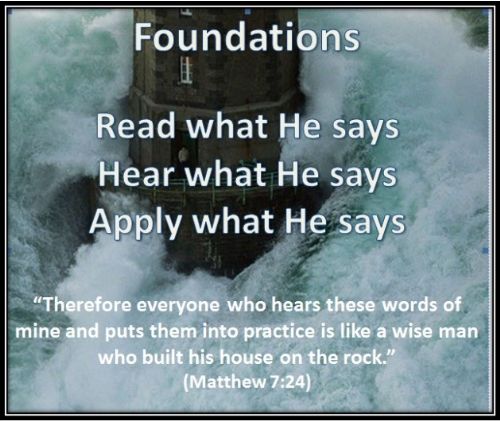Matthew 7:24-29 (ESV)
24 "Everyone then who hears these words of mine and does them will be like a wise man who built his house on the rock. 25 And the rain fell, and the floods came, and the winds blew and beat on that house, but it did not fall, because it had been founded on the rock. 26 And everyone who hears these words of mine and does not do them will be like a foolish man who built his house on the sand. 27 And the rain fell, and the floods came, and the winds blew and beat against that house, and it fell, and great was the fall of it.28 And when Jesus finished these sayings, the crowds were astonished at his teaching, 29 for he was teaching them as one who had authority, and not as their scribes.
- What does the foundation of rock represent?
Deuteronomy 32:4 (ESV)
4 "The Rock, his work is perfect,
for all his ways are justice.
A God of faithfulness and without iniquity,
just and upright is he.
Matthew 7:24 (ESV)
24 "Everyone then who hears these words of mine and does them will be like a wise man who built his house on the rock.
Luke 6:48 (ESV)
48 he is like a man building a house, who dug deep and laid the foundation on the rock. And when a flood arose, the stream broke against that house and could not shake it, because it had been well built.
Psalm 18:2 (ESV)
2 The Lord is my rock and my fortress and my deliverer,
my God, my rock, in whom I take refuge,
my shield, and the horn of my salvation, my stronghold.
Thoughts: Luke describes the wise builder as digging deep and laying the foundation on a rock. The Rock on which we build is Christ Himself. In His description of the two builders, He judges them, not only by their care in building their houses, but also by the foundation on which they build. A rock foundation represents true understanding and right action—true conviction and commitment manifested in righteousness. Only in obedience and dedication to a personal relationship with Christ the Rock can we find emotional and spiritual stability—without which even our most dedicated purposes rest on shifting sand.
- What does the foundation of sand represent?
Matthew 7:26 (ESV)
26 And everyone who hears these words of mine and does not do them will be like a foolish man who built his house on the sand.
Luke 6:49 (ESV)
49 But the one who hears and does not do them is like a man who built a house on the ground without a foundation. When the stream broke against it, immediately it fell, and the ruin of that house was great."
Thoughts: Christ knew that some coming to build would be attracted to a ready-prepared level surface of sand rather than to sites that must be excavated to reach the hard and rugged rock. We often choose what looks easy on the surface. But after the seasonal floods, representing trials and tests, such a builder would have nothing left but a heap of ruins. A sandy foundation represents empty preference and mere external religion based on false knowledge. The sand reflects the shifting, uncertain feelings some foolish people possess, the only ground upon which they act. The second house, even though most impressive, stands on a shifting foundation, and is therefore doomed to destruction. People whose resolves do not rest on God's help sought in prayer—people who have virtues without root—live in a dangerous position.
- What do the rain, floods, and wind represent?
Matthew 7:25 (ESV)
25 And the rain fell, and the floods came, and the winds blew and beat on that house, but it did not fall, because it had been founded on the rock.
Matthew 7:27 (ESV)
27 And the rain fell, and the floods came, and the winds blew and beat against that house, and it fell, and great was the fall of it."
Thoughts: Floods and hurricanes can damage seemingly strong houses and destroy those less strongly built. When Christ says, "the rain fell," He compares the times of testing to the forces of a rainstorm threatening the roof of the house and the fears it creates. "The floods came" pictures turbulent torrents undermining walls. "The winds blew" depicts sweeping, hurricane-like winds threatening a house's walls. These combined natural forces remind us that spiritual elements try and test our spiritual houses. Sometimes these forces come in the way of persecution, suffering, or temptations—all of which will erode a weak foundation, but not a solid one. Christ describes the disaster descending on the house built on the sand as "great [in] its fall." By doing so, He warns us to avoid a similar end. Foolish builders should heed His warning and build on a solid Rock foundation, that of Jesus Christ.
- What do the builders represent?
Matthew 7:24 (ESV)
24 "Everyone then who hears these words of mine and does them will be like a wise man who built his house on the rock.
Matthew 7:26 (ESV)
26 And everyone who hears these words of mine and does not do them will be like a foolish man who built his house on the sand.
Luke 6:47-49 (ESV)
47 Everyone who comes to me and hears my words and does them, I will show you what he is like: 48 he is like a man building a house, who dug deep and laid the foundation on the rock. And when a flood arose, the stream broke against that house and could not shake it, because it had been well built. 49 But the one who hears and does not do them is like a man who built a house on the ground without a foundation. When the stream broke against it, immediately it fell, and the ruin of that house was great."
Thoughts: In the wise and foolish builders, Christ describes two categories in illustrating the building of a house. Both houses appear equally attractive and substantial, but their comparative stability differs greatly. In their construction, the materials and labor used were similar, and both houses appeared upright, solid, and sound. Many times, seemingly good people who are uncalled seem to build their lives well and wisely in terms of money, material possessions, and friends. All these things seem good to the human mind, but their end can be disastrous without a Rock foundation. The elect of God build their houses differently, by daily obedience, service, overcoming, Bible study, and prayer.





